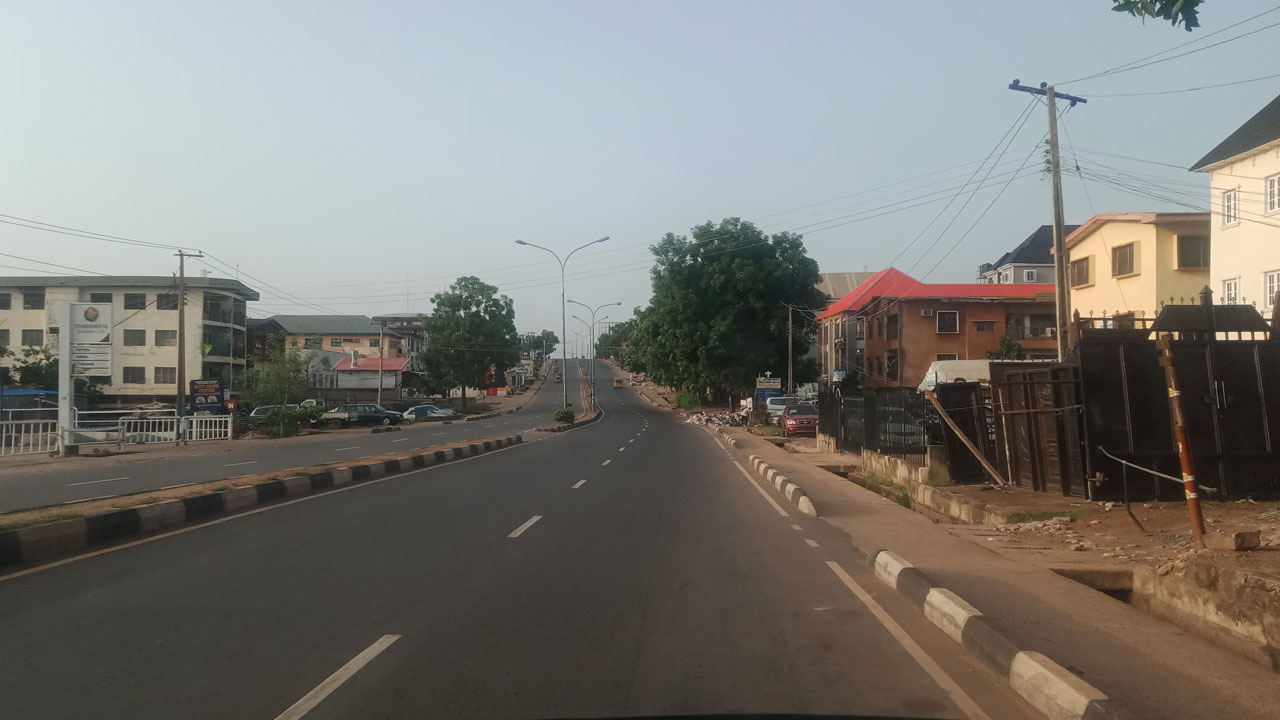
The school is also not on holiday. It is simply because there is an ‘order’ by the Indigenous People of Biafra (IPOB) compelling residents of the Southeast to stay at home any day their leader, Mazi Nnamdi Kanu, was appearing in court to answer charges levelled by the Federal Government against him.
So, the adjourned date of Kanu’s hearing was Tuesday and as it is customary, every human activity in the region, except the ones done inside the home, was curtailed and these including school activities.

The sit-at-home order was observed due to the court sitting was not the only one in the zone that disrupted academic activities. There is the regular Monday sit-at-home that started in August last year, which would clock one year in August this year.
The Monday sit-at-home exercise was in reaction to the incarceration of Kanu and was declared to put pressure on the government to release him “unconditionally” from DSS custody.
Although there were pressures to rescind the order when its consequences began to tell on the economy of the region, a splinter group that emerged from the main pro-Biafra body had insisted on its full observance.
They had moved into the streets and began to attack those found to be doing businesses on Monday and soon the people retreated. To the splinter group, the sit-at-home on Monday must continue until Kanu is released.

Thus, little Chinonso, still in primary four, at government-owned New Haven primary school, Enugu, would have to keep away from school on Monday and any other day that Kanu would be tried in court.
Civil disobedience does not put into consideration the educational curriculum; it does not also matter whether there were external examinations involving students from the Southeast region any day it is supposed to be observed. The only thing that matters to those that called for the action is for residents to ensure its full compliance.
The last leg (third term) of the 2021/2022 academic session began on May 9. About twelve school weeks have gone by since then. Of the twelve weeks, however, about twelve days in which the children were supposed to be in school had been spent as sit-at-home and still running.
It was apparently to tackle the challenge of missing out on school completely on Mondays and any other day Kanu was appearing in court that some schools, especially privately owned, have employed various means to meet up with the curriculum. While some have extended closure periods daily from 2.30 pm to 4.30 pm, others have included Saturday as part of school days and in some cases, upload notes online for students to copy. There are others still brainstorming on how to tackle the challenge.
In one of the meetings called by one of the private schools in Enugu for parents, which The Guardian attended, the parents refused to allow their children to come to school on Saturday, saying it would negatively impact them. They rather called for an extension of closing time, which the teachers rejected on grounds that they would need to prepare for the next day’s classes and still take care of their families.
It does not appear that the matter has been resolved. The sit-at-home order on school days has continued to pose challenges to parents, students and school authorities in the southeast region. Even in schools where closing time is pushed forward, students still find it difficult to cope as they would return home late, wash their uniforms, attend to take-home assignments and probably would not have time to review the previous day’s lesson.
Those who have agreed that lessons be uploaded online still complain of data to download the notes and the power supply challenge.
During the last WASSCE examination, several students in Southeast missed out on the day the English Language was written. The paper was taken on a Monday, which was declared a sit-at-home in the region. While some had arrived at their venue late due to transport and security issues, others did not show up at all, while hoodlums enforcing the order moved to schools and chased students writing the examination away.
Months ago, parents were made to take their children involved in the junior secondary school examination to school as early as 5 a.m. on Mondays to beat the day’s sit-at-home order.
An educationist, Dr Samuel Ibe, told The Guardian in Enugu that the negative impact the sit-at-home on school days has had in the region would require time to be addressed, explaining that it now affects the payment of school fees, lesson fees, home teacher fees, procurement of data and power supply among others, on the parents.
He argued that the workload on students had increased with the extended school periods, adding that most teachers can no longer meet with the curriculum and syllabus due to the disruptions.
“What we do now could be classified as a crash programme for students to meet with the scheme of work. The teacher here cares less whether the student copes or not”, he said.
DECRYING an observation recently made by a corporate sponsor about the poor performance of Southeast schools in quiz competitions organised by the corporation, Ibe stated that the situation would worsen in the coming years unless something drastic is done to checkmate the loss of school hours in the zone due to sit-at-home.
Commenting on the development, a teacher in a secondary school in Awka, Anambra State, Mrs Ngozi Nwankwo, said the Monday sit-at-home had impacted negatively on the academic standard of pupils and students, both in primary and secondary schools, as well as undergraduates in tertiary institutions.
“School curricula are not covered due to the break in teaching before the end of the term, leaving gaps in the workload and teachers/ students do not have enough time to cover the syllabus. Monday is the beginning of the week, and in most cases, the day of introduction of new topics to the class leaves much to be desired. These holidays create more work for teachers, who now rush the students to cover the workload.
“You see youths playing football on the streets, while others engage in games, gathering at odd places, rather than studying their books. Having observed Saturday, Sunday and Monday as school-free days, some of them tend to forget what they had learnt.
“It’s a serious problem because most teachers don’t cover the syllabus, especially the JSS 3 and SS 3 classes before their final examinations. We have to rush them, where possible, organise extra classes or lessons for them, as well as pupils writing primary six entrance examination into secondary school.
“It tells much on students and pupils who feel this burden of much workload because the teacher has to cover much ground on each subject. When we arrange for extra lessons, some parents don’t welcome it. Even students feel tired and exhausted to continue lessons after school.
“It is high time government opened dialogue with these agitators or gunmen that have instilled fear into people in this region,” she noted.
Mr Pius Igboanugo, a retired school principal, described the situation as an ill wind that blows nobody any good, adding that it had become a serious problem for children and youths.
“There is no doubt that the agitators have held our education system to ransom. Sound education, being the foundation for academic and economic development, the zone is gradually drowning in producing half-baked or illiterate children in Igbo society in the next 10 years.
“Some parents have taken the development as an advantage to introduce their children into economic activities, including buying and selling items, especially foodstuffs in the market. Some turn to street selling. They don’t send the children for lessons to encourage them to feel the school system, while in the suburbs or villages, parents send them to farms.
“It baffles me when people talk about losing hundreds of millions of Naira in the business sector across the Southeast, but they forget that the future of our children is at stake. Children outside our zone are having their normal studies, and at the end, they all write the same Unified Tertiary Matriculation Examination (UTME) questions and other educational competitions. It’s an unfortunate development and we should look for a lasting solution to it.”
He called on those responsible for the unwarranted holidays to sheath their sword while tasking the government to find ways to open talks with the gunmen to help innocent children plan for the future.
Fabian Oduche, a student, lamented the hardship the Monday sit-at-home has put on him, adding that he now helps his uncle (guardian) as an apprentice in his mechanic workshop every Monday.
In Abia State, the sit-at-home order is observed on Mondays and other days so imposed, partially in some areas and full in others. Some markets and offices, including schools, remain open.
However, those who disregard or disobey the orders do so apprehensively.
The scenario with respect to school attendance is such that it breeds truancy on the part of pupils, students, teachers and workers, who hinge their absence on the order.
A parent said she cannot allow her children to attend classes where security is not assured. Even when they are in school, there is apprehension because of fear of what may happen.
According to a primary school Head Teacher and a secondary school Principal who, though spoke separately to The Guardian anonymously, not much is taught and learnt on sit-at-home days because there is lateness and poor attendance which partly can be attributed to transport difficulties.
Describing the scenario as unhealthy for effective teaching and learning, the Education Secretary for Umuahia North Council, Clement Onyeoziri, said though classes go on, they are not as they ought to be.
Speaking on the sit-at-home declaration that has seemingly come to stay “until God intervenes,” Mrs Chinwe Ugele, of the Rock Kids Academy, Umuahia, said the orders and compliance, have in no small measures affected teaching and learning in private schools in Abia State since public schools are not in session due to ongoing strike action.
According to her, the development has no single positive impact on schools since it reduces teaching and learning periods, adding that the day’s schools are forced to shut down are meant for topics contained in the syllabuses.
Wondering how these missed periods can be recovered, she stated that the implication is that the children are stressed to learn and understand topics that ought to be spread for three days in one day for teachers to exhaust the scheme of work.
“On the other hand, the teachers may be unable to teach all that is in the work schedule because there are subjects that you cannot rush.
“In a country where everyone is complaining about falling standard of education, a zone is still forced by non-state actors to stay at home on any day they choose whilst the children miss out in the area of formal learning.
“Some schools no longer observe mid-term break for them to cover those lost days, yet it is not enough. The more sit-at-homes we have, the possibility of recording education mishaps in the zone is likely. The only people likely benefitting from this whole mess are the staff members who would celebrate every break they get.”
To Mrs Ugele, the Southeast zone might soon be categorised as an educationally disadvantaged zone if this condition persists.
IN Imo State, schools are shut as students, pupils, schools officials and other residents in the 27 Local Government Councils continue to comply with the sit -at- home order every Monday and any day the leader of the Indigenous Peoples of Biafra (IPOB), Mazi Nnamdi Kanu, appears in court.
Speaking with The Guardian, at different locations, pupils, students, principals and heads of schools, complained about the situation, appealing to the IPOB and government at all levels to find a solution to the problem.
They also lamented the conversion of roads/streets by students into playing fields, while some in their teens increase in immoral activities at home.
A pupil of Naze Secondary School, Owerri North Local Government Council of Imo State, simply named Chinedu, said he resorted to learning how to repair phones and related accessories on that day.
Chinedu said: “Though I am feeling the pain of not going to school both on Mondays and any day Kanu is to appear in court, I now utilise the days to learn phone repair, which my elder brother teaches me. It is an alternative”
On the part of Tochi Eze, a private school proprietor in the Federal Housing Estate axis in Owerri, the situation has lowered the educational and academic capabilities of students.
“We simply stay at home, without doing anything; sleep and wake, do any domestic work. It is really boring. Let this stop. Also, hours of teaching are reduced. This is not acceptable at all. Let this stop”, she said
The state government and the police have urged residents to go about their businesses on Mondays and any day that Kanu is billed to appear in court, but the fear of unknown gunmen is holding people, leading to the closure of markets, schools, markets, business outlets and public places. Vehicles also desert the streets.






